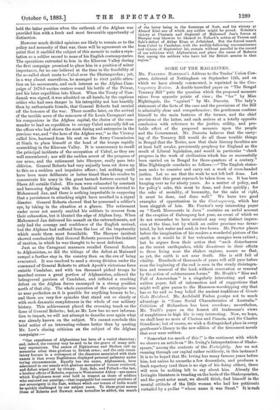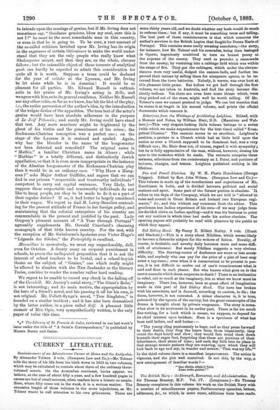SOME OF THE MAGAZINES.
MR. FREDERIC HARRISON'S Address to the Trades' Union Con- gress, delivered at Nottingham on September 12th, and on
which we have already commented, is reprinted in the Con-
temporary Review. A double-barrelled paper on "The Bengal Tenancy Bill" puts the question which the proposed measure raises from opposite points of view ; the " for " by Miss Nightingale, the " against " by Mr. Dacosta,. The lady's statement of the facts of the case and the provisions of the Bill is admirably clear and comprehensive ; the gentleman confines himself to the main features of the former, and the chief provisions of the latter, and each arrives at a totally opposite conclusion with reference to the justice, utility, and pro- bable effect of the proposed measure upon the people and the Government. Mr. Dacosta believes that the carry- ing of the Tenancy Bill would do all those terrible things in Bengal that the Tories, now that their literary faculties are at least half awake, persistently prophesy for England as the result of Liberal legislation, and would in particular "check progress in the work of civilisation which has so successfully been carried on in Bengal for three-quarters of a century."
Miss Nightingale concludes as follows :—" The English states- man seeks to conceive and carry out a work of even-handed justice. Let us see that the work be not left half done. Let us see that this great reproach be taken from us. It has been hanging over us for ninety years. As a matter of policy, and for policy's sake, this must be done, and done quickly ; for the sake of morality, of humanity, for the sake of right, it must be done, and done well." We have two good examples of opportunism in the Contemporary, which has been sluggish of late. Mr. Proctor's very interesting paper on "Earth Movements in Java" contains an awful account of the eruption of Galungung last year, an event of which we do not remember to have received any very distinct impres- sion at the time, but by which an entire province was devas- tated, by hot water and mud, in two hours. Mr. Proctor places before the imagination of his readers a wonderful picture of the earth as it would be if her vulcanian energies were extinct ; but he argues from their action that "such disturbances as the recent earthquakes, while disastrous in their effects to those living near the shaken regions, assure us Chat, as yet, the earth is not near death. She is still full of vitality. Hundreds of thousands of years will still pass before even the beginning of the end is seen in the steady disintegra- tion and removal of the land, without renovation or renewal by the action of subterranean forces." Mr. Heath's "Rise and
Fall of Amsterdam" is a singularly interesting and well. written paper, full of information and of suggestions that
might well give pause to the Mammon-worshipping city that has so far and so long belied the ancient traditions of Groole Gods Huisland. Mr. Archibald Forbes gossips not to much
advantage in "Some Social Characteristics of Australia." Criticism of Richardson has been overdone ; nevertheless, Mr. Traill's paper on the honest old tradesman's views of naughtiness in high life is very interesting. Now, we hope, we shall hear no more of Clarissa and Pamela, and Sir Charles Grandison ; bat of course, we wish a distinguished place in every gentleman's library to the new edition of the tiresomest novels that ever were written.
"Somewhat too much of this !" is the sentiment with which we observe an article on " Mr. Irving's Interpretations of Shake- speare," among the contents of the Fortnightly. Are we not running through our capital rather recklessly, in this instance ?
It is to be hoped that Mr. Irving has many famous years before him, but unless he unearths a few dramatists, and produces a fresh repertory (and there is no sign of his doing either), there will soon be nothing left to say about him. Already the Irvingite literature is treading on the heels of the Shakespearian,
and the great actor must, we should think, find himself in the mental attitude of the little woman who had her petticoats curtailed by a pedlar "whose name it was Stout." It is rash
to intrude upon the musings of genius, but if Mr. Irving does not sometimes say, "Goodness gracious, bless my soul, sure this is
not I!" he must be the most remarkable man in this country, or even in that he is going to. To be sure, a vast amount of the so-called criticism lavished upon Mr. Trying has its origin in the eagerness of certain littgrateurs to make the world under-
stand that they are the only people who really know what Shakespeare meant, and that they are, on the whole, cleverer
fellows ; but the ostensible object of these torrents of analytical gush can hardly be expected to admit this consideration for quite all it is worth. Suppose a truce could be declared for the year of releiche at the Lyceum, and Mr. Irving be let alone while he is in America ! It would be so pleasant for all parties. Mr. Edward Russell is enthusi- astic in his praise of Mr. Irving's acting in Bells, and we agree with him as to its general excellence. Neither Mr. Russell nor any other critic, so far as we know, has hit the blot of the play, i.e., the entire perversion of the author's idea, by the introduction of the vulgar device of the apparition. The true test of the actor's genius would have been absolute adherence to the purpose of Le Tuif Polonais ; and surely Mr. Irving could have stood that test. Any mere murderer might be frightened by the- ghost of his victim and the presentment of his crime ; the Erckmann-Chatrian conception was a perfect one ; on the stage of the Lyceum it is maimed and spoiled. Again, why has the blunder in the name bf the burgomaster not been detected and remedied P The original name is "Mathis," a familiar Christian name in Alsace ; while " Mathias " is a totally different, and distinctively Jewish appellation, so that it is even more inappropriate in the instance of the Alsatian burgomaster of the Erckmann-Chatrian play than it would be in an ordinary case. "Why Have a Hang- man ?" asks Major Arthur Griffiths, and argues that we can find in our prisons "respectable and trustworthy individuals" competent to carry out capital sentences. Very likely, but suppose those respectable and trustworthy individuals do not like to hang people, are they to be made to do it as a part of their regular duties ? If so, it had better be largely considered in their wages. We regret to find M. Leroy-Beaulieu contend- ing for the present attitude of France in her foreign policy, and maintaining that the colonial enterprises of his country are commendable in the present and justified by the past. Lady Gregory's pleasant account of "A Tour through Portugal" agreeably supplements Mr. Oswald Crawfurd's charming monograph of that little known country. For the rest, with the exception of Mr. Swinburne's hysterics over Victor Hugo's " Ligende des Siecles," the Fortnightly is excellent.
Macmillan is excessively, we must say unpardonably, dull, even for October. A dreary essay on corporal punishment in schools, to prove the undisputed proposition that it is not the interest of school teachers to be brutal, and a school-boyish theme on the subject of "Genius," one which really might be allowed to slumber with the New Zealander or the literary Tories, combine to render the number rather hard reading.
We regret to be unable to record any check in the falling.off of the Cornhill. Mr. Anstey's serial story,." The Giant's Robe," is not interesting ; and its main motive, the appropriation by the hero of a friend's novel, and his passing it off for his own, is not original. Mr. Follett-Synge's novel, "Tom Singleton," is founded on a similar incident ; and it has also been dramatised by the latter author, in a piece called Se?! A pleasant little memoir of Mrs. Opie, very sympathetically written, is the only paper of value this time.



































 Previous page
Previous page